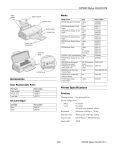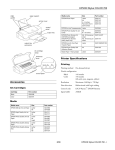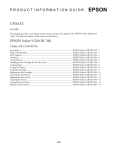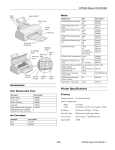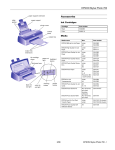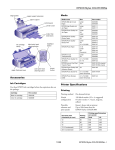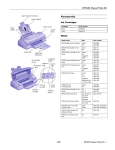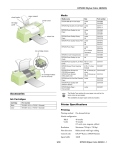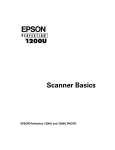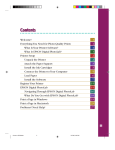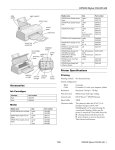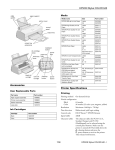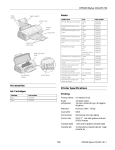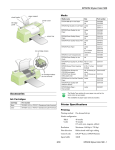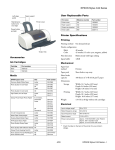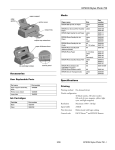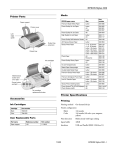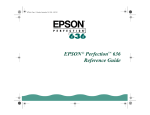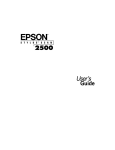Download Epson Stylus Scan 2500 Specifications
Transcript
EPSON Stylus Scan 2500 paper edge guide Media paper support paper feeder document cover Operate button control panel document table output tray Paper name Size Part number EPSON 360 dpi Ink Jet Paper Letter S041060 A4 (8.3 x 11.7 inches) S041059 EPSON High Quality Ink Jet Paper Letter S041111 A4 (8.3 x 11.7 inches) S041117 EPSON Photo Quality Ink Jet Paper Letter S041062 option cover S041067 Letter S041257 EPSON Photo Quality Glossy Film Letter S041072 paper thickness switch internal cover S041061 Legal Matte Paper - Heavyweight EPSON Photo Paper maintenance cover A4 (8.3 x 11.7 inches) A4 (8.3 x 11.7 inches) S041071 A6 (4.1 x 5.8 inches) S041107 4 x 6 inches S041134 Letter S041141 A4 (8.3 x 11.7 inches) S041140 Panoramic (8.3 x 23 inches) S041145 EPSON Photo Quality Glossy Paper Letter S041124 A4 S041126 EPSON Photo Quality Ink Jet Cards A6 (4.1 x 5.8 inches) S041054 8 x 10 inches S041122 EPSON Photo Stickers Kit (CD-ROM/paper) A6 (4.1 x 5.8 inches) S041144-KIT EPSON Photo Stickers (refill) A6 (4.1 x 5.8 inches) S041144 EPSON Ink Jet Transparencies Letter S041064 EPSON Photo Quality Self Adhesive Sheets A4 (8.3 x 11.7 inches) S041106 EPSON Iron-On Cool Peel Transfer Paper Letter S041153/ S041155 Options Accessories Ink Cartridges Cartridge Option Part number Automatic document feeder (standard with EPSON Stylus Scan Pro model) B813142 Transparency unit B813172 Part number Black S020189 Color S020191 9/99 EPSON Stylus Scan 2500 - 2 EPSON Stylus Scan 2500 System Requirements ❏ Double-speed (2x) CD-ROM (quad-speed [4x] or faster recommended) for installing the software Windows® ❏ Available USB port or hub connection, with shielded USB “AB” interface cable, from Series A (computer) to Series B (EPSON Stylus Scan), up to 6.5 feet (2 m) long ❏ An IBM® compatible PC with at least a 486/66 MHz processor (Pentium® processor recommended) Note: If your iMac is running Mac OS 8.1, you need to install the iMac Update 1.0 before installing the EPSON Stylus Scan software. If your iMac is running Mac OS 8.5 or 8.51, Apple recommends that you install iMac Update 1.1. ❏ Microsoft® Windows 95 or 98 ❏ At least 16 MB of RAM (32MB or more recommended) ❏ At least 50MB of free hard disk space (100MB recommended) These updates are available online from Apple at http:// swupdates.info.apple.com. Contact Apple if you have problems installing them. ❏ VGA or better display adapter and monitor (24-bit color recommended) ❏ Double-speed (2x) CD-ROM drive for installing the software (quad-speed [4x] or faster recommended) for installing the software Specifications Your system should also have one of the following interfaces (USB recommended): Mechanical ❏ Windows 98 only: Available USB port or hub connection, with shielded USB “AB” interface cable, from Series A (computer) to series B (EPSON Stylus Scan), up to 6.5 feet (2 m) long* Paper feed method Friction Paper path Sheet feeder, rear entry Sheet feeder capacity About 100 sheets at 17 lb (64 g/m²) paper ❏ Windows 95 or 98: Available parallel port with a highspeed, bidirectional, IEEE-1284-compliant parallel cable (6 to 10 feet long).The cable must have a D-SUB, 25-pin, male connector for your computer and a 36-pin, Centronics® compatible connector for the Stylus Scan.** Dimensions Storage Width: 20.4 inches (517 mm) Depth: 20.8 inches (529 mm) Height: 11.8 inches (300 mm) Printing Width: 20.4 inches (517 mm) Depth: 22.6 inches (575 mm) Height: 11.8 inches (300 mm) Caution: Using an improperly shielded USB cable—especially a cable more than 6.5 feet long—may cause the Stylus Scan to malfunction. Notes: * If you’re using a USB connection, Windows 98 must be preinstalled on your system—not an upgrade from Windows 95. Weight * If you’re using a USB hub, use only a first tier hub (the hub closest to the host computer). 26.5 lb (12 kg) without the ink cartridges Printing Printing method On-demand ink jet Nozzle configuration Monochrome (black) 144 nozzles ❏ iMac® series or other Macintosh computer with built-in USB port Resolution Maximum 1440 dpi × 720 dpi ❏ Mac OS 8.1 or later (OS 8.5 or later recommended) Print direction Bidirectional with logic seeking ❏ At least 32MB of available memory (64MB recommended) Control code ❏ At least 50MB of free hard drive space (100MB recommended) ESC/P raster EPSON Remote Input buffer 64 KB ** The EPSON Stylus Scan must be connected to a built-in parallel port (LPT 1 only). It cannot be used with a switch box or pass-through port (for example, on a Zip drive). Macintosh® ❏ VGA or better monitor (24-bit color recommended) 3 - EPSON Stylus Scan 2500 9/99 Color (cyan, magenta, yellow) 144 nozzles (48 [each color] × 3) EPSON Stylus Scan 2500 Paper Paper type Size Paper types Thickness Single sheets Letter (8.5 × 11 inches) Legal (8.5 × 14 inches) Half letter (statement, 5.5 × 8.5 inches) Executive (7.5 × 10 inches) A4 (210 × 297 mm) A5 (148 × 210 mm) B5 (182 × 257 mm) Plain bond paper, special papers distributed by EPSON 0.003 to 0.004 inch 17 to 24 lb (0.08 to 0.11 mm) (64 to 90 g/m2) for plain bond paper Special papers distributed by EPSON — — Transparencies, Glossy film Letter (8.5 × 11 inches) A4 (210 × 297 mm) A6 (105 × 148 mm), glossy film only Weight Self-adhesive sheets A4 (210 × 297 mm) Special papers distributed by EPSON — — Envelopes No. 10, 9.5 × 4.1 inches (240 × 104 mm) DL, 8.7 × 4.3 inches (220 × 110 mm) C6, 4.4 × 6.4 inches (114 × 162 mm) 132 × 220 mm Plain bond paper or air mail paper 0.006 to 0.02 inch (0.16 to 0.52 mm) 12 to 20 lb (45 to 75 g/m2) Index cards A6 (105 × 148 mm) 5 × 8 inches (127 × 203 mm) 10 × 8 inches (254 × 203 mm) Special papers distributed by EPSON — — Photo paper Letter (8.5 × 11 inches) A4 (210 × 297 mm) 4 × 6 inches (102 × 152 mm) Panoramic (210 × 594 mm) 100 × 150 mm 200 × 300 mm Special papers distributed by EPSON — — Photo stickers A6 (105 × 148 mm) with 4 or 16 frames Special papers distributed by EPSON — — Special papers distributed by EPSON — — Matte paper - Heavyweight A4 (210 × 297 mm) Note: Since the quality of any particular brand or type of paper may be changed by the manufacturer at any time, EPSON cannot attest to the quality of any non-EPSON brand or type of paper. Always test samples of paper stock before purchasing large quantities or printing large jobs. Poor quality paper may reduce print quality and cause paper jams and other problems. If you encounter problems, switch to a higher grade of paper. Do not load curled or folded paper. Use paper under normal conditions: Temperature: 59 to 77 °F (15 to 25 °C) Humidity: 40 to 60% RH EPSON Photo Quality Glossy Film and Self Adhesive Sheets should be stored under the following conditions: Temperature: 59 to 86 °F (15 to 30 °C) Humidity: 20 to 60% RH 9/99 EPSON Stylus Scan 2500 - 4 EPSON Stylus Scan 2500 Printable Area A A BL BR BR BL C Envelopes C Single sheets (including panoramic size) and index cards A The minimum top margin is 0.12 inch (3.0 mm). When printing multiple sheets of EPSON Photo Quality Glossy Film, the minimum top margin is 1.2 inches (30 mm). BL The minimum left margin is 0.12 inch (3.0 mm). BR The minimum right margin is: 1.10 inches (28 mm) for #10 envelopes 0.28 inch (7.0 mm) for DL envelopes 0.12 inch (3.0 mm) for all other paper sizes. C The minimum bottom margin is 0.55 inch (14.0 mm). You can extend the minimum bottom margin to 0.12 inch (3.0 mm) by selecting Maximum as the Printable Area setting on the printer driver's Paper menu (for Windows) or Page Setup dialog box (for Macintosh). Please note that print quality may decline in the expanded area. Before printing large jobs using this setting, print a single sheet to confirm printout quality. Note: Always load paper into the sheet feeder short edge first. Load envelopes flap edge first with the flap side down. Ink Cartridges Specification Black ink cartridge (S020189) Color ink cartridge (S020191) Color(s) Black Cyan, magenta, and yellow Print capacity* 900 pages (A4, text at 360 dpi) 300 pages (A4, 360 dpi, 5% duty each color) Cartridge life 2 years from production date (within 6 months after opening package, at 77 °F (25 °C)) Storage temperature –4 to 104 °F (–20 to 40 °C) 1 month at 104 °F (40 °C) Transit temperature –22 to 140 °F (–30 to 60 °C) 1 month at 104 °F (40 °C) 120 hours at 140 °F (60 °C) Freezing temperature** 3.2 °F (–16 °C) –0.4 °F (–18 °C) Dimensions 1.09 (W) × 2.1 (D) × 1.5 (H) inches 27.8 (W) × 52.7 (D) × 38.5 (H) mm 1.7 (W) × 2.1 (D) × 1.5 (H) inches 42.9 (W) × 52.7 (D) × 38.5 (H) mm Caution: To ensure good results, use genuine EPSON cartridges and do not refill them. Other products may cause damage to your printer not covered by EPSON’s warranty. Do not use an ink cartridge after the expiration date on the package. Scanning * The figure given is based upon continuous printing after ink replacement. The actual print capacity may vary, depending on how often you use the print head cleaning function and how often you turn the printer on. Flatbed color image scanner Photoelectric device: Color CCD line sensor Effective pixels: 5100 × 7020 pixels at 600 dpi, 100% Document size: 8.5 × 11.7 inches (216 × 297 mm) A4 or US letter size (The reading area can be specified from your software.) Scanning resolution: 600 dpi (main) 2400 dpi (sub) Output resolution: 50 dpi to 9600 dpi (50 to 4800 dpi in 1 dpi increments, 7200 dpi and 9600 dpi performed with zoom function) Color separation: RGB color filters on CCD ** The ink thaws and is usable after approximately 3 hours at 77 °F (25 °C). 5 - EPSON Stylus Scan 2500 Scanner type: 9/99 Zoom: 50 to 200% in 1% increments Image data: 12 bits per pixel per color internal 8 bits per pixel per color external Brightness: 7 levels EPSON Stylus Scan 2500 Line Art settings: Fixed threshold Text Enhancement Technology (enable/disable selectable) Halftoning process: Gamma correction: Interfaces USB interface AAS (Auto Area Segmentation) Error Diffusion 3 mode (A, B, C) Dither (Resident) 4 mode (A, B, C, D) Dither (User defined) 2 mode (A, B) CRT display 2 level Printer 3 level (A, B, C) User defined 1 level Color correction: 1 type for CRT display Impact-Dot Printer Thermal Printer Ink-jet Printer 1 type for user-defined USB + IEEE1284.4 Light source: White cold cathode fluorescent lamp Reliability: 30,000 cycles of carriage movements (main unit MCBF) Lamp: Life 10,000 hours Specification 100—120 V model 220—240 V model Input voltage range 99 to 132 V 198 to 264 V Rated frequency range 50 to 60 Hz Input frequency range 49.5 to 60.5 Hz Rated current 0.7 A Based on Universal Serial Bus Specifications Revision 1.0, Universal Serial Bus Device Class Definition for Printing Devices Version 1.0 Bit rate 12 Mbps (full speed device) Data encoding NRZI Adaptable connector USB Series B Recommended cable length 6.5 feet (2 meters) Specification Description Data format 8-bit parallel, IEEE-1284 compatibility mode, IEEE-1284 ECP mode Synchronization STROBE pulse Handshake timing BUSY and ACKNLG signals Signal level TTL compatible Connector 57-30360 Amphenol connector or equivalent Reverse channel Specification Description Transmission mode IEEE-1284 Nibble mode, IEEE-1284 ECP mode Adaptable connector 57-30360 Amphenol connector or equivalent 0.4 A Approx. 32 W (ISO 10561 Letter Pattern) Environmental Humidity Standard Forward channel Electrical Temperature Description Parallel interface Interface: Power consumption Specification Operation: 50 to 95 °F (10 to 35 °C) Storage*: –4 to 104 °F (–20 to 40 °C) 1 month at 104 °F (40 °C) Transit*: –4 to 140 °F (–20 to 60 °C) 120 hours at 140 °F (60 °C) Synchronization Refer to the IEEE-1284 specification Handshaking Refer to the IEEE-1284 specification Signal level IEEE-1284 Level 1 device Data transmission timing Refer to the IEEE-1284 specification Operation: 20 to 80% RH Storage*: 5 to 85% RH (without condensation) * Stored in shipping container Safety Approvals Safety standards UL 1950 with D3, CSA 22.2 No. 950 EMC FCC part 15 subpart B class B 9/99 EPSON Stylus Scan 2500 - 6 EPSON Stylus Scan 2500 Control Panel Testing the Printer LCD panel Scan Paper Size You can run a printer check to determine whether the problem comes from the EPSON Stylus Scan or your computer. Copy Darker/Lighter Reduce/Enlarge B&W/Color Quality Stop/Clear Copies Error 1. Make sure both the EPSON Stylus Scan and your computer are turned off. Operate Set Hold for Menu Return Item 2. Disconnect the interface cable from the EPSON Stylus Scan. The LCD panel displays the current copy settings. When you first turn on the EPSON Stylus Scan, you see these default settings: 100% B&W Normal 1. This means you’re set to produce one black and white copy, of the same size as the original document, at Normal quality (360 dpi resolution for everyday copying). 3. Make sure paper is loaded. 4. Hold down the E load/eject button, then press and release the POperate button. Continue holding down the E load/eject button until the Operate light starts to flash, then release it. Accessing Menu Mode A check page is printed, showing the ROM version number, ink counter, and a nozzle check pattern. You can use the control panel’s Menu Mode to print a status sheet, set the bottom margin, change from U.S. to metric paper sizes, set the language on the LCD panel, or reset the control panel to the factory defaults. 5. After the page is printed, turn off the power. Then reconnect the interface cable and turn on your EPSON Stylus Scan and computer. ❏ To access Menu Mode, hold down the B&W/Color and Quality buttons until Menu Mode appears in the LCD panel. ❏ If the results are satisfactory, the problem lies in your software settings, the interface cable, or your computer. ❏ If the check page does not print correctly, you may have a problem with your EPSON Stylus Scan. ❏ To exit Menu Mode, hold down the B&W/Color and Quality buttons until the LCD panel displays the copy mode settings. Using Special Media Loading Paper Selecting Special Media To load paper, slide out the left edge guide and place the stack of paper against the right side of the sheet feeder. Then slide the left edge guide against the paper. Slide the left edge guide against the paper. When you print on special media, you need to choose the correct Media Type and Paper Size settings in your printer software. The table below lists the available EPSON media and the corresponding Media Type setting for each one. Cut corner If the paper has a cut corner, make sure you load it as shown. 7 - EPSON Stylus Scan 2500 9/99 Media name Media Type setting Plain paper sheets or envelopes Plain paper EPSON 360 dpi Ink Jet Paper EPSON Iron-On Cool Peel Transfer Paper 360 dpi Ink Jet Paper EPSON High Quality Ink Jet Paper EPSON Photo Quality Ink Jet Paper EPSON Photo Quality Ink Jet Cards EPSON Photo Quality Self Adhesive Sheets Photo Quality Ink Jet Paper EPSON Photo Paper EPSON Photo Quality Glossy Paper Photo Paper EPSON Photo Quality Glossy Film EPSON Photo Stickers Photo Quality Glossy Film EPSON Ink Jet Transparencies Ink Jet Transparencies EPSON Matte Paper–Heavyweight Matte Paper– Heavyweight EPSON Stylus Scan 2500 Paper Loading and Handling Guidelines 2. Remove only the yellow part of the tape seal on top. Don’t pull off the blue portion or try to remove the clear seal underneath the cartridge. The following tips help you get the best results: ❏ Always load the printable side (the whiter and brighter side) face up. Some special papers come with a cut corner to help you load them correctly. ❏ Load letterhead or preprinted paper so the top of the paper feeds into the printer first. ❏ Don’t load paper above the arrow on the left edge guide. ❏ You can load up to 20 sheets of Photo Paper, 30 transparencies, and 30 Photo Quality Ink Jet Cards. For Photo Quality Ink Jet Paper, you can load up to the arrow mark on the left edge guide. Note: If you have an automatic document feeder, remove it from the EPSON Stylus Scan, but don’t disconnect it from the option interface. ❏ Use a support sheet if you find it in the paper package. ❏ Return unused paper to the original package as soon as you finish printing. 3. Make sure the EPSON Stylus Scan is turned on and not printing. Open the document cover, and then open the maintenance cover. The internal cover opens automatically. Replacing an Ink Cartridge When you’re low on ink or one of the cartridges is empty, you’ll see a message on the LCD status display panel. It’s a good idea to keep new cartridges on hand, since you can’t print if either ink cartridge is empty. document cover maintenance cover Caution: To ensure good results, use genuine EPSON cartridges and do not refill them. Other products may cause damage to your printer not covered by EPSON’s warranty. internal cover Use these EPSON ink cartridges within six months of installing them and before the expiration date on the package: ❏ Black ink cartridge: S020189 ❏ Color ink cartridge: S020191 4. Press the R cleaning button and hold it for about three seconds until the print head moves left and the Operate light begins flashing. If you need to replace an ink cartridge before you see a message (because the ink is too old, for example) follow the instructions in “Replacing an Outdated Ink Cartridge” on page 9. Caution: Don’t open the clamp or remove a cartridge except to replace it with a new one. Once you remove a cartridge, you can’t reuse it, even if it contains ink. Removing and Installing Ink Cartridges You can replace a cartridge whenever you see a message that the cartridge is low on ink or empty. (If you press the R cleaning button before you see a message, the EPSON Stylus Scan cleans the print head, as described on page 9. Follow these steps: Also, never move the print head by hand. 1. Remove the new ink cartridge from its package. Caution: You must remove the yellow tape from the top of the cartridge or you will permanently damage it. Do not remove the clear seal from the bottom of the cartridge, or ink will leak out. 9/99 EPSON Stylus Scan 2500 - 8 EPSON Stylus Scan 2500 Replacing an Outdated Ink Cartridge 5. Pull up the ink cartridge clamp. The cartridge rises up from its holder. Even if you don’t see a message that a cartridge is low on ink or empty, you may need to replace it if it’s more than six months old. If your printouts don’t look as good as they used to, try cleaning and aligning the print head first. If print quality doesn’t improve, try replacing one or both cartridges. Follow these steps to replace an ink cartridge before you see a message on the LCD status display panel: 1. Prepare your new ink cartridge for installation as described in “Removing and Installing Ink Cartridges” on page 8. 2. Make sure the EPSON Stylus Scan is turned on and not printing. Then open the document and maintenance covers. Warning: If ink gets on your hands, wash them thoroughly with soap and water. If ink gets into your eyes, flush them immediately with water. 3. Press the E load/eject button and hold it down for about three seconds until the print head moves left. The Operate light begins flashing. Keep ink cartridges out of the reach of children. 4. Remove the old ink cartridge and install the new cartridge as described in “Removing and Installing Ink Cartridges” on page 8. Don’t press the R cleaning button, however. 6. Lift the cartridge out of the EPSON Stylus Scan and dispose of it carefully. 5. Close the maintenance and document covers and press the E load/eject button. 7. Lower the new ink cartridge into its holder with the label facing up and toward the back of the printer. Don’t press down on the cartridge. Caution: To avoid damaging the printer, never move the print head by hand. 8. Press down the ink cartridge clamp until it locks in place. The EPSON Stylus Scan moves the print head and begins charging the ink delivery system. The Operate light flashes and the printer makes various sounds. Charging takes about 60 seconds. When it’s finished, the Operate light stops flashing and stays on. Cleaning the Print Head If your printouts are light or have gaps in the image, you may need to clean the print head. This unclogs the nozzles so they can deliver ink properly. 9. If you need to replace the other ink cartridge, repeat the preceding steps before going on to step 10. Cleaning the print head uses ink, so clean it only if print quality declines. You can clean the print head using either: 10. Close the maintenance and document covers, and then press the R cleaning button. ❏ The Head Cleaning utility in your printer software (with the printer connected to a local port, not over a network) Caution: Never turn off the printer while the Operate light is flashing, unless the printer hasn’t moved or made any noise for more than five minutes. ❏ The EPSON Stylus Scan’s control panel buttons. Using the Head Cleaning Utility The EPSON Stylus Scan moves the print head and begins charging the ink delivery system. The Operate light flashes and the printer makes various sounds. Charging takes about 60 seconds. When it’s finished, the Operate light stops flashing and stays on. 9 - EPSON Stylus Scan 2500 1. Make sure the EPSON Stylus Scan is turned on but not printing. Also, make sure that there’s no ink out message on the LCD status display panel. 9/99 EPSON Stylus Scan 2500 Examining the Nozzle Check Pattern 2. Start an application and open a document. Access the printer settings dialog box. 3. Click the Utility tab (Windows) or the (Macintosh). You see the Utility menu. Examine the nozzle check pattern you print. It should look something like this (the upper pattern should be black; the lower section is divided into blue, red, and yellow sections): Utility icon 4. Click the Head Cleaning icon. Follow the instructions on the screen to print a test page. 5. Follow the instructions on the screen to clean the print head. Caution: Never turn off the EPSON Stylus Scan while the Operate light is flashing, unless it hasn’t moved or made any noise for more than 5 minutes. Cleaning takes a couple minutes, during which the EPSON Stylus Scan makes some noise and the Operate light flashes. When the Operate light stops flashing, continue with the next step. Each staggered horizontal and straight vertical line should be complete, with no gaps in the dot pattern. If your printout looks okay, you’re done. If any dots are missing, as shown below, clean the print head again. 6. Make sure paper is loaded in the EPSON Stylus Scan and click Print nozzle check pattern (Windows) or Confirmation (Macintosh). The nozzle check pattern prints. (See page 10 for details.) missing dots 7. If the nozzle check pattern is complete, click Finish. If the pattern is missing dots, click Clean to run another cleaning cycle. Using the Control Panel to Clean the Print Head 1. Make sure the EPSON Stylus Scan is turned on but not printing. Also, make sure that there’s no ink out message on the LCD status display panel. Aligning the Print Head 2. Press the R cleaning button and hold it down for three seconds. Cleaning takes a couple minutes, during which the EPSON Stylus Scan makes some noise and the Operate light flashes. Caution: Load paper that’s at least letter-size width to prevent ink from spraying inside the EPSON Stylus Scan and smudging your printouts. For best results, load EPSON ink jet paper whenever you check the print head alignment. 3. After the Operate light stops flashing, start an application and open a document. If you’re connected directly to the EPSON Stylus Scan, continue with step 4. If your printouts contain vertical bands or crooked vertical lines, you may need to use the Print Head Alignment utility in your printer software. Your EPSON Stylus Scan must be connected directly to a local port, not over a network, to use this utility. Follow these steps: If you’re on a network, print the document. Then go to step 7. 4. Access the printer settings dialog box. Then click the Utility tab (Windows) or the Utility icon (Macintosh). You see the Utility menu. 1. Make sure the EPSON Stylus Scan is turned on and paper is loaded. 5. Click the Nozzle Check icon, then follow the instructions on the screen to run the nozzle check and clean the print head. 3. Access the printer settings dialog box. 2. Start an application and open a document. 4. Click the Utility tab (Windows) or the (Macintosh). You see the Utility menu. 9/99 Utility icon EPSON Stylus Scan 2500 - 10 EPSON Stylus Scan 2500 4. Push the transportation lock right to lock the scanner carriage. 5. Click the Print Head Alignment icon. Follow the instructions on the screen to print a test page and select the correct alignment. Cleaning the EPSON Stylus Scan To keep your EPSON Stylus Scan operating at its best, clean it several times a year. Follow these steps: 1. Turn the EPSON Stylus Scan off, unplug the power cord, and disconnect the cable. Warning: Be careful not to touch the internal gears. Lock the transportation lock. 2. Remove all paper from the sheet feeder. Push in the output tray extension. 3. Use a soft brush to clean loose dust and dirt. 5. Close the maintenance and document covers. 4. Use a soft, clean cloth and mild detergent to clean the outer case and inside of the sheet feeder. Be careful not to soak the cloth—just dampen it. Keep the document and maintenance covers closed to prevent moisture from getting inside. 6. Remove all paper from the sheet feeder, and then remove the paper support. 7. Push in the output tray extension. Caution: Be sure to remove the tape used in step 8 before printing. 5. Clean the document table with a soft, dry cloth, or with a blower brush. 8. Use tape to secure the document cover. Secure the ink cartridge holder to the printer with tape, as shown below. 6. If ink leaks inside the EPSON Stylus Scan, wipe it away with a damp cloth. Caution: Never use alcohol or thinners, and never spray lubricants inside the EPSON Stylus Scan. You could damage the printer mechanisms. Transporting the EPSON Stylus Scan Use tape here. Caution: To avoid damage, always leave the ink cartridges installed when transporting the EPSON Stylus Scan. Also, remember to lock the print head and the transportation lock. 9. Use the original box and packing materials to repack the EPSON Stylus Scan. For short moves, you can just pick up the EPSON Stylus Scan and set it down. For longer moves, you need to repack it in its original box and lock the print head and transportation lock. 10. Keep the EPSON Stylus Scan level during transport. Follow these steps: Cleaning the Automatic Document Feeder’s Paper Path Guide 1. Turn on the EPSON Stylus Scan and wait until the print head locks in position. Then turn off the EPSON Stylus Scan. If you have an automatic document feeder and the quality of your scans or copies declines, cleaning the paper path guide might fix the problem. 2. Unplug the power cord, and then disconnect the interface cable. 3. Open the document and maintenance covers. 11 - EPSON Stylus Scan 2500 9/99 EPSON Stylus Scan 2500 Turn off the EPSON Stylus Scan, then follow these steps to clean the guide: 5. Pull the paper path guide up and out. 1. Disconnect the automatic document feeder’s connector from the EPSON Stylus Scan’s option interface. 2. Lift the automatic document feeder straight up to remove it. 6. Using a soft, dry cloth, gently wipe any dust from the guide’s transparent plastic sheet. Be careful not to scratch the guide. 7. Reattach the paper path guide. Insert the transparent plastic sheet under the white mat. 3. Remove the paper support. 8. Insert the guide’s tabs through the brackets at the back of the automatic document feeder. Push until the tabs clip into place. 4. Place the automatic document feeder on a flat surface and turn it over. Locate the two white tabs at one end of the paper path guide. Pull the tabs slightly up, then push them through the brackets. Related Documentation TM-SCAN2500 PL-SCAN2500 CPD-8875 CPD-8874 9/99 EPSON Stylus Scan 2500 Service Manual EPSON Stylus Scan 2500 Parts Price List EPSON Stylus Scan 2500 User’s Guide EPSON Stylus Scan 2500 Start Here sheet EPSON Stylus Scan 2500 - 12











